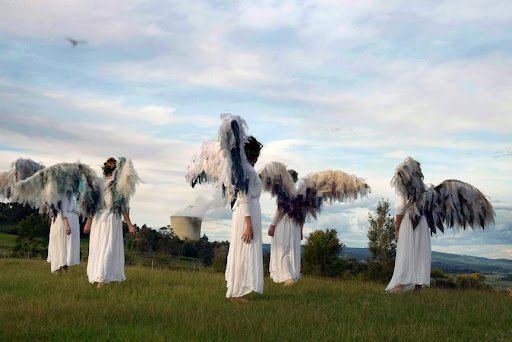By: Rachael Jacobs
At this end of the world, we are currently battling devastating floods and COVID outbreaks, all in the shadow of international conflict. These seem dark times, and our only normal is change. The change is rapid and chaotic. It feels hard to get a handle on stability. And with that, the arts and creative sectors seem to again be on the edge of precarity.
The arts have literally had the rug pulled out from under them. Just weeks ago the Enmore Theatre, an institution of the Sydney live performance scene, had its floor collapse during a Genesis Owusu concert, after relentless rain destroyed its foundations. From northern NSW we have seen images of mountains of instruments destroyed as the flood waters washed through the Northern Rivers Conservatorium. From Brisbane, scenes of dance studios submerged.
Image by Facebook/ Catherine Marciniak Twitter/ Zani Louise
After two years of near collapse from COVID, the arts sector is literally drowning.
Of course, the arts aren’t the only sector devastated by natural disaster and the pandemic. And in this blog we remember the thousands left homeless and in peril as a result of the relentless storms and rain.
A clear line has been drawn between the frequency of unpredictable weather and natural disasters in Australia and climate change. The devastation of our spaces and industries is a stark reminder that the arts, like every section of society, will feel the effects of climate change, and our sector will have to endure more constant disruptions if temperatures continue to rise. While this blog has painted a bleak picture, there is hope as well. Countless artists are using their craft to fight back, placing climate activism at the forefront of their message.
Jessica Harwood is an artist and campaigner living on Gadigal Land in Warang (Sydney). Her work has recently been featured in the Guardian Australia, drawing attention to the IPCC (Intergovernmental Panel on Climate Change) report that was released amidst the catastrophic flood disaster. She pulls no punches with the Australian government, which is plagued by climate sceptics and chronic inaction on climate change. However, her hopeful message also points out that “there are lots of small positive actions you can take to counteract malaise and despair: for people, communities and the world”. Full cartoon here https://bit.ly/3tiChib
ClimActs is an incredible non-profit and volunteer-run performance art collective that uses spectacle and satire to highlight the urgency of the climate and biodiversity crisis. Their performative actions hold to account powerful polluters and their enablers (politicians, financiers, media) who are responsible for the climate crisis. I’ve been on the frontline of protests with them, and when they show up in their beautifully crafted costumes, you absolutely feel like you’re in the presence of climate guardian angels. They argue that “strategic, performative direct action can communicate important and sensitive information in non-threatening and yet enormously effective ways.”
Image: Peter Houghton
There are so many other examples of spaces where arts activism is making a difference. On March 25th there’ll be another climate strike led by school students. At these events I’m always blown away by the creativity of the young people leading this fight. I was hugely entertained by choral singers from the Sydney Conservatorium High School who arranged a delightful chant with only the words ‘Stop Adani’ (Adani is the shortened name of the proposed mega coal mine to be built in Queensland). I’ve listened with tears in my eyes to powerful songs calling for urgent change. I’ve marked alongside drummers and dancers, who make sure they are heard in every sense.
Peter Parks / AFP / Getty Images
We need every voice in the fight against the dark forces that are perpetuating inaction on climate change. But some of the most powerful voices will tap into our humanity, our emotions, our sense of what it is to be human, and our aesthetic sense. Science cannot win this fight alone. In fact, people use false information and flat out denial to fight against the science of climate change.
But, once you feel something, you are profoundly changed. That’s why the arts are crucial to this fight. They activate our critical thinking skills, and allow us to see beyond what is, to what might be.
Solidarity to all arts activists around the world fighting against war, inequality, injustice, destruction and despair. You give us all hope to fight another day.
-
Jacobs, R. (2022, March 30). NAVIGATING: Disasters Upon Crises. Creative Generation Blog. Creative Generation. Retrieved from https://www.creative-generation.org/blogs/navigating-disasters-upon-crises



